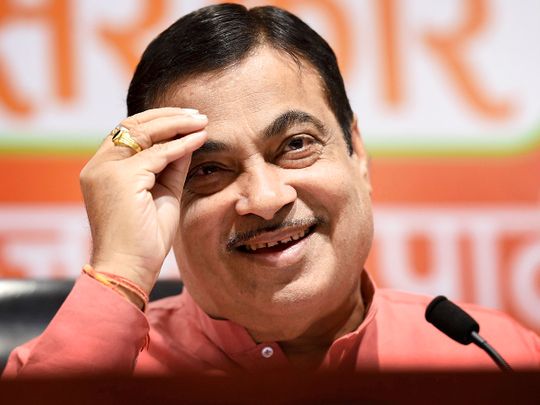
New Delhi: Union Minister and senior BJP leader Nitin Gadkari described Prime Minister Narendra Modi’s attack on Rajiv Gandhi as a “reaction” to the “insults” that he has been subjected to by the Congress party and asserted that he cannot be blamed for it.
Targeting the Congress for calling Modi a “chor” (a thief), he said it was “very unfortunate” that such language was being used against a person holding the post of Prime Minister.
In an interview to IANS, Gadkari said use of such language against the prime minister creates a “bad image” of the country, particularly when the whole world is closely watching the elections in the largest democracy.
“The prime minister is not the prime minister of the BJP. He is the prime minister of the country,” he underlined, adding that it is the “duty of all political parties and people of the country to respect” whoever holds this post.
“To call the prime minister a ‘chor’ is very unfortunate,” said Gadkari, former President of the Bharatiya Janata Party.
He said there can be differences of opinion, which is understandable, but use of foul language was not good for the democracy.
“There should be difference of opinion but no ill will,” the Minister for Road Transport and Highways, Shipping and Water Resources said.
His attention was drawn to the fact that even the Prime Minister has made certain remarks, like calling late Rajiv Gandhi ‘corrupt number 1’, which many feel does not behove his stature.
“This is action and reaction. When someone is using a word, it is expected from the other person to respond in the same language. It is action and reaction.
“I feel in politics, it is sometimes a game of actions and reactions. You cannot blame a person for a reaction. When there is action, there is reaction from the other side. It is unfortunate,” the senior BJP leader added.
At the same time, he stressed the need for going beyond “who is responsible” and said, “it is time for all in the democracy to think qualitatively how we are going to improve the atmosphere”.
Gadkari was asked whether he was trying to justify Modi’s ‘brashtachari number 1’ remark against Rajiv Gandhi when he said on Thursday that the prime minister had been “abused 56 times”.
“The way the prime minister was insulted 56 times, is it good for the country? The prestige and respect of the prime minister is not respect of any one political party. He is the prime minister of the country... These types of remarks are not good for the country,” he said.
The minister said it was not good that “hard words” are exchanged between parties.
He stressed that there should be “a political battle with policies, programmes and performance of the present government and what is the future perspective that the opposition can give. This type of qualitative discussion may change the total scenario of the democracy.”
Noting that India is the largest democracy in the world, Gadkari said: “The whole world is examining, seeing everything in the country. It is going to create a bad image for the country the way in which words are used by the political parties. It is really the time for the country to think about how we can bring about qualitative reform in the system.”
He said the four pillars of the Indian democracy — the judiciary, the executive, the legislature and the media — should see how to “encourage the quality in the political life, how we can make valuable transformation, which is value based for the democracy”.
He added that “this is the time we have to 100 per cent clean the political system. This is the time to subtract negative from the present atmosphere. We have to achieve a good atmosphere”.
Gadkari said the media also has a “major role” in encouraging such negativity in the political discourse.
“We are building a good expressway from Meerut to Delhi. No one is going to write a good thing [about it]. But if there is one pot hole, they are going to take photographs and give to media,” he said, adding “Negative and contradictions are very much good liking for media. They always want to add flavour to it. It is not good.”
He said media is generally interested in controversies and “it is time for all stake holders of democracy to protect our democracy and bring about qualitative reform in the system”.











